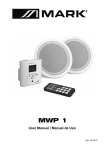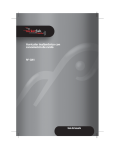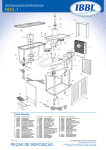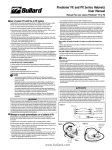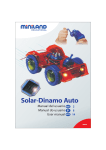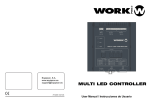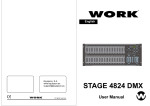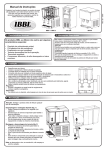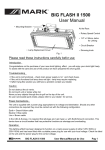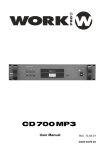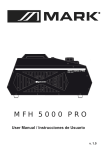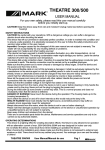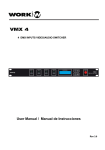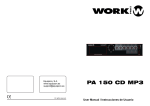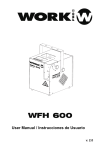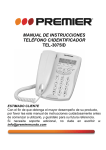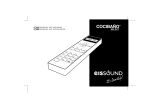Download IC 4 PRO IC 6 PRO
Transcript
Equipson, S.A. www.equipson.es [email protected] IC 4 PRO IC 6 PRO CEILING SPEAKERS SERIES User Manual / Instrucciones de Usuario CEILING SPEAKERS ALTAVOCES DE TECHO ENGLISH Page 1 CASTELLANO Página 3 This symbol on the product or on its packaging indicates that this product shall not be trated as household waste. Instead it shall be handed over to the applicable collection point for the recycling of electrical an electronic equipment. By ensuring this product is disposed of correctly, you will help prevent potential negative consequences for the environment and human health, which could otherwise be caused by inappropriate waste handling of this product. The recycling of amterials will help to conserve natural resources. For more detailed information sabout recycling of this product, please contact your local city office, your household waste disposal service or the shop where you purchased the product. Este símbolo en su equipo o embalaje, indica que el presente producto no puede ser tratado como residuos domésticos normales, sino que deben entregarse en el correspondiente punto de recogida de equipos electrónicos y eléctricos. Asegurándose de que este producto es desechado correctamente, Ud. está ayudando a prevenir las consecuencias negativas para el medio ambiente y la salud humana que podrían derivarse de la incorrecta manipulación de este producto. EL reciclaje de materiales ayuda a conservar las reservas naturales. Para recibir más información, sobre el reciclaje de este producto, contacte con su ayuntamiento, su punto de recogida más cercano o el distribuidor donde adquirió el producto. IC 4/6 PRO Ceiling Speakers Series IC 4 PRO Especificaciones Respuesta de frecuencia. . . . . . . . . . . . . . . . . . . . . . . . . . . . . . . . . . . . . . . . 80 Hz a 20 kHz Impedancia . . . . . . . . . . . . . . . . . . . . . . . . . . . . . . . . . . . . . . . . . . . . . . . . . . . 8 ohms (30 W) Sensibilidad. . . . . . . . . . . . . . . . . . . . . . . . . . . . . . . . . . . . . . . . . . . . . . . . . . . . . . . . . . . . 88 dB Woofer. . . . . . . . . . . . . . . . . . . . . . . . . . . . . . . .4" cono de polipropileno y suspensión de goma Tweeter. . . . . . . . . . . . . . . . . . . . . . . . . . . . . . . . . . . . . . . . . . . . . . . .0.75" montaje central. Dimensiones. . . . . . . . . . . . . . . . . . . . . . . . . . . . . . . . . . . . . . . . . . . . 184 mm diametro x 114 mm prof Posiciones del transformador . . . . . . . . . . . . . . . . . . . . . . . . . . . . . .70 V(8W, 4W, 2W, 1W, 0.5W) 100 V(8W, 4W, 2W, 1W) These in-wall, or in-ceiling, speakers are designed to accurately reproduce music, including today's demanding digital signals. In-wall speakers are designed so that the wall and the space behind it actually become the speaker cabinet. Mounted flush to the wall, they require absolutely no floor space. The frames and grilles may be painted to blend with any decor. The discrete, com-pact format is ideal for many applications where traditional speakers would be impractical or impossible. In-wall speakers may be used independently where space is a consideration, or to bring music to additional rooms in the house. They can also be used to enhance and enrich subwoofer and surround sound systems, for which they are especially suited. Speaker Placement Once installed, in-wall speakers are not easily moved or repositioned. Take a little extra time to carefully consider a good speaker location before you begin. Each room is unique, so decide what works best for you. Unlike traditional speakers, in-walls mount flush and cannot be angled or aimed back into the listening area from the corners of a room. As a general rule, the speakers should be mounted close to, or above, ear level, and at least one-third of the distance from the corner of the room to the center of the wall or ceiling in which you will mount them. 1 Allow at least 1 2" of clearance between the cut out and any studs or joists for the mounting hardware to work properly. A mounting depth of 175 mm measured from the face of the wall is also required. The speaker location and associated mounting hardware should not conflict with any existing wires or pipes. Hooking Up The Wires IC 6 PRO Especificaciones Respuesta de frecuencia. . . . . . . . . . . . . . . . . . . . . . . . . . . . . . . . . . . . . . . . 60 Hz a 20 kHz Impedancia . . . . . . . . . . . . . . . . . . . . . . . . . . . . . . . . . . . . . . . . . . . . . . . . . . . 8 ohms (60 W) Sensibilidad. . . . . . . . . . . . . . . . . . . . . . . . . . . . . . . . . . . . . . . . . . . . . . . . . . . . . . . . . . . . 88 dB Woofer. . . . . . . . . . . . . . . . . . . . . . . . . . . . . . .6.5" cono de polipropileno y suspensión de goma Tweeter. . . . . . . . . . . . . . . . . . . . . . . . . . . . . . . . . . . . . . . . . . . . . . . .0.75" montaje central. Dimensiones. . . . . . . . . . . . . . . . . . . . . . . . . . . . . . . . . . . . . . . . . . . . 241 mm diametro x 171 mm prof Posiciones del transformador . . . . . . . . . . . . . . . . . . . . . . . . . . . . . .70 V(50W, 30W, 15W, 5W, 3W) 100 V(50W, 30W, 15W, 5W) The terminals will accommodate up to 16-gauge speaker wire, which should be used for longer connections (greater than 50 feet of wire). For shorter distances, 18 or 20 gauge speaker wire will be adequate. Leave about two feet of extra wire at the speaker end to make installation and positioning of the speaker easier. Do not use staples, nails or other metal objects to secure the speaker wire. The resulting short circuit could affect your system's performance, and could also damage components in your system, espe-cially the amplifier. You will get the best sound quality and least amount of hum by keeping the speaker wires away from other electrical wires and cables. When connecting your in-wall speaker, it is very important to retain the correct polarity. To do this, be sure that the wire attached to the right power "top" of audio transformer on the speaker connects to the "+", red, positive or hot terminal on the amplifier. Similarly, the "C", black, negative or ground terminal of audio transformer on the speaker must connect to the respective "-", black, negative or ground terminal on the amplifier. Mounting the Speaker Yes, you will be cutting a hole in the wall. With the right tools and a little extra care and preparation, installing the in-wall speaker can be both quick and easy. Carefully cut out the hole drawn on the paper template at the perforated edge labeled “CUT HERE FOR MOUNTING TEMPLATE”. (Note: The inside ring on the template can be used to shield the woofer while you paint the frame.) Next, position the template (now a border) where you have chosen to mount the speaker, and trace along the inside edge. Make your cuts along this line. A utility knife will make the cleanest cuts in drywall. A keyhole saw or an electric jigsaw may also be used. Try to keep the cuts neat, however the frame will overlap the hole to hide any rough edges. At this point, with the wall open, run the speaker wires into position, and again, leave about two feet of extra wire at the opening. Remove the grille from the frame by pressing the quick-turn mounting screws from the back of the speaker into the grille itself. Remove the thin piece of foam positioned under the grille, which was used to protect the speaker during transport. Attach the speaker wires to the speaker. With the grille removed, insert the speaker into the mounting hole. Use a phillips head screwdriver to turn the screw slowly clockwise. The quick-turn mounting system and frame will sandwich or clamp around the wall to hold the speaker in place. Do not overtighten. If you are unsure, consult a professional contractor. Installing The Grille Selector de potencia de salida Diseño y especificaciones sujetas a cambio sin previo aviso IC 4/6 PRO User Manual/Manual de uso Página 4 The metal grille, as well as the frame, may be painted to match any room. If you choose to paint them, do so before attaching the grille to the speaker. The grille is held in place by a friction fit and is difficult to remove once the speaker is installed. If the grille feels a little loose, or you are concerned about a grille falling from a ceiling installation, we have provided a small amount of putty, which you can apply (sparingly) to the inside rim of the speaker before you insert the grille. The putty acts as an additional adhesive between the grille and the frame. IC 4/6 PRO User Manual/Manual de uso Page 1 IC 4/6 PRO Altavoces de Techo IC 4 PRO Specifications Frequency Response. . . . . . . . . . . . . . . . . . . . . . . . . . . . . . . . . . . . . . . . 80 Hz to 20 kHz Impedance . . . . . . . . . . . . . . . . . . . . . . . . . . . . . . . . . . . . . . . . . . . . . . . . . . . . 8 ohms (30 W) Sensitivity. . . . . . . . . . . . . . . . . . . . . . . . . . . . . . . . . . . . . . . . . . . . . . . . . . . . . . . . . . . . . 88 dB Woofer. . . . . . . . . . . . . . . . . . . . . . . . . . . . . . . . . .4" polypropylene cone with rubber surround Tweeter. . . . . . . . . . . . . . . . . . . . . . . . . . . . . . . . . . . . . . . . . . . . . . . .0.75" center mounted Dimensions. . . . . . . . . . . . . . . . . . . . . . . . . . . . . . . . . . . . . . . . . 184 mm diameter x 114 mm depth Posiciones del transformador . . . . . . . . . . . . . . . . . . . . . . . . . . . . . .70 V(8W, 4W, 2W, 1W, 0.5W) 100 V(8W, 4W, 2W, 1W) IC 6 PRO Estos altavoces de techo y pared están diseñados para reproducir de manera adecuada la música reproducida, incluyendo l a actual demanda de música digital. Los altavoces de pared están diseñados de tal manera que el espacio trasero se convierte en la caja de resonancia del altavoz. Estos altavoces no necesitan una gran profundidad de pared para ser colocados. Las rejillas y bordes están pintadas en blanco para integrarlo en la decoración. Este formato compacto y discreto es ideal para multitud de aplicaciones donde el altavoz tradicional no pueda ser colocado y para ambientar habitaciones, salas u oficinas. Tambien pueden ser usados para realzar los sistemas de sonorización. Colocación del altavoz Una vez instalado el altavoz, no es fácil moverlo o recolocarlo. Tómese su tiempo para elegir cuidadosamente el lugar de instalación. Cada habitación es única, así que decida la mejor ubicación al resultado que desea conseguir. Al contrario que los altavoces tradicionales, estos altavoces de pared no pueden ser colocados en ángulo o aprovechar su rebote en esquinas etc. Como norma general, estos altavoces deben ser colocados cerca o a nivel del oido y al menos a una distancia de un tercio desde la esquina al centro de la habitación. Deje, al menos, 1.5” de separación entre el corte y elementos como vigas u otros sistemas de techo o pared para poder trabajar con facilidad a la hora de instalar. Se requiere asimismo una profundidad de al menos 175 mm. La localización del altavoz y elementos asociados, no debe entrar en conflicto con sistemas de cables o tuberías ya existentes. Specifications Frequency Response. . . . . . . . . . . . . . . . . . . . . . . . . . . . . . . . . . . . . . . . 60 Hz to 20 kHz Conectando los cables Impedance . . . . . . . . . . . . . . . . . . . . . . . . . . . . . . . . . . . . . . . . . . . . . . . . . . . 8 ohms (60 W) Sensitivity. . . . . . . . . . . . . . . . . . . . . . . . . . . . . . . . . . . . . . . . . . . . . . . . . . . . . . . . . . . . . 88 dB Woofer. . . . . . . . . . . . . . . . . . . . . . . . . . . . . . . . . .6.5" polypropylene cone with rubber surround Tweeter. . . . . . . . . . . . . . . . . . . . . . . . . . . . . . . . . . . . . . . . . . . . . . . .3/4" center mounted Dimensions. . . . . . . . . . . . . . . . . . . . . . . . . . . . . . . . . . . . . . . . . 241 mm diameter x 171 mm depth Posiciones del transformador . . . . . . . . . . . . . . . . . . . . . . . . . . . . . .70 V(50W, 30W, 15W, 5W, 3W) 100 V(50W, 30W, 15W, 5W) Los terminales se conectan a un cable de altavoz de 16 gauge, el cual debe ser usado para conexiones largas (Mayores de 15 m), para conexiones menores los cable 18 o 20 gauge son adecuados. Deje al menos unos 60 cm. de cable para facilitar el instalación y posicionar el altavoz. No use grapas o clavos para sujetar el cable de altavoz. Usar estos elementos metálicos podría cortocircuitar los cables y afectar al rendimiento del altavoz, dañando incluso los amplificadores. Obtendrá un mejor rendimiento con un sonido libre de zumbidos y ruidos si aleja los cables de altavoz de los cables eléctricos. Cuando conecte el altavoz es importante respetar la polaridad. Para ello asegúrese que el cable marcado como “top” se conecta al “+” o cable rojo del amplificador. De igual manera el cable “C” negro o negativo, debe conectarse al terminal “-” , masa o negro del amplificador. Montando el altavoz Ahora debe realizar el corte en la pared o techo con la plantilla adjunta y con la herramienta adecuada y tomándose su tiempo. Corte con cuidado por la linea de puntos marcada como “CUT HERE FOR MOUNTING TEMPLATE” (Nota: el aro interno puede ser usado para para proteger el altavoz en caso de necesitar pintar el marco). Ahora posicione la plantilla en el lugar elegido para el montaje. Dibuje el circulo resultante. Haga el corte por esta línea. Puede utilizar un cuchillo, o cualquier tipo de cortante. Trate de realizar un corte limpio. En este punto, con el hueco realizado, coloque los cables hasta la posición, dejando al menos unos 40 cm de cable libre. Retire la rejilla del marco presionando desde la parte trasera del altavoz. Retire la pieza fina de espuma bajo la rejilla, la cual se usa para proteger el altavoz durante el transporte. Conecte los cables al altavoz. Con la rejilla quitada, inserte el altavoz en el agujero. Use un destornillador para apretar los tornillos lentamente. El sistema de fijación y el marco, se insertarán alrededor del agujero hecho, manteniendo el altavoz en su sitio. No fuerce su fijación. Power Output selector Design and specifications are subject to change without notice. Instalando la Rejilla La rejilla de metal, así como el marco pueden pintarse para integrarlo en la decoración de la sala. Si elije pintarlo, hágalo, antes de colocar la rejilla al altavoz. La rejilla se fija con un sistema de fricción con lo cual es dificil de retirar una vez instalado el altavoz. Si la rejilla pierde adherencia al altavoz o se desprende, es mejor utilizar un poco de masilla en el interior antes de fijar la rejilla. La masilla actúa como un adhesivo entre la rejilla y el marco. IC 4/6 PRO User Manual/Manual de uso Page 2 IC 4/6 PRO User Manual/Manual de uso Página 3




